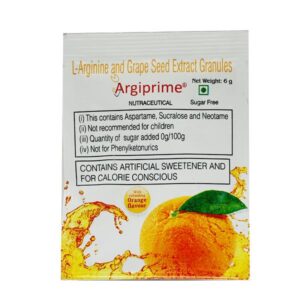L-ARGININE + PROANTHOCYANIDIN
L-Arginine: L-Arginine is an amino acid that is naturally produced by the body and is also found in certain foods. It is commonly used as a dietary supplement, and it is believed to have various health benefits.
L-Arginine is known for its role in the production of nitric oxide, a molecule that helps to relax and widen blood vessels. This mechanism of action is thought to improve blood flow, which can be beneficial for various conditions such as erectile dysfunction, high blood pressure, and angina (chest pain).
The recommended dose of L-Arginine varies depending on the specific condition being treated. For example, the typical dose for erectile dysfunction is around 5 grams per day, while for angina, it may range from 6 to 20 grams per day. However, it is important to consult with a healthcare professional to determine the appropriate dosage for your specific needs.
L-Arginine is generally considered safe when taken in appropriate doses. However, some side effects may occur, especially at higher doses. These can include gastrointestinal symptoms such as stomach pain, diarrhea, and bloating. It may also cause low blood pressure, allergic reactions, worsen asthma symptoms, and interact with certain medications. Individuals with certain health conditions, such as kidney disease or herpes outbreaks, should exercise caution or avoid L-Arginine supplementation altogether.
It is crucial to note that L-Arginine can interact with medications and worsen certain medical conditions. Therefore, it is essential to consult with a healthcare professional before starting L-Arginine supplementation, especially if you have pre-existing medical conditions or are taking other medications.
Proanthocyanidin: Proanthocyanidin is a natural compound found in various plants, particularly in grape seeds. It is a type of flavonoid that possesses strong antioxidant properties. It is used as a dietary supplement and is often marketed for its potential health benefits.
The mechanism of action of Proanthocyanidin is attributed to its antioxidant activity. It helps neutralize free radicals in the body, which are unstable molecules that can cause damage to cells and contribute to various diseases, including heart disease and cancer. By reducing oxidative stress, Proanthocyanidin may help improve overall health and protect against certain chronic conditions.
The recommended dose of Proanthocyanidin can vary depending on the specific product and its concentration. As a dietary supplement, it is typically available in capsule or tablet form. It is important to follow the instructions provided by the manufacturer or consult a healthcare professional for the appropriate dosage.
Proanthocyanidin is generally considered safe when taken in the recommended doses. However, there is limited research on its long-term effects and potential interactions with medications. Some individuals may experience mild side effects, such as gastrointestinal discomfort, including nausea, vomiting, or diarrhea. Allergic reactions are rare but possible.
It is crucial to note that Proanthocyanidin supplements should not be used as a substitute for a balanced diet. It is always recommended to obtain nutrients and antioxidants from a variety of fruits, vegetables, and other natural sources.
Before starting any new supplement, it is essential to consult with a healthcare professional, especially if you have any underlying medical conditions or are taking other medications to avoid any potential interactions or adverse effects.

